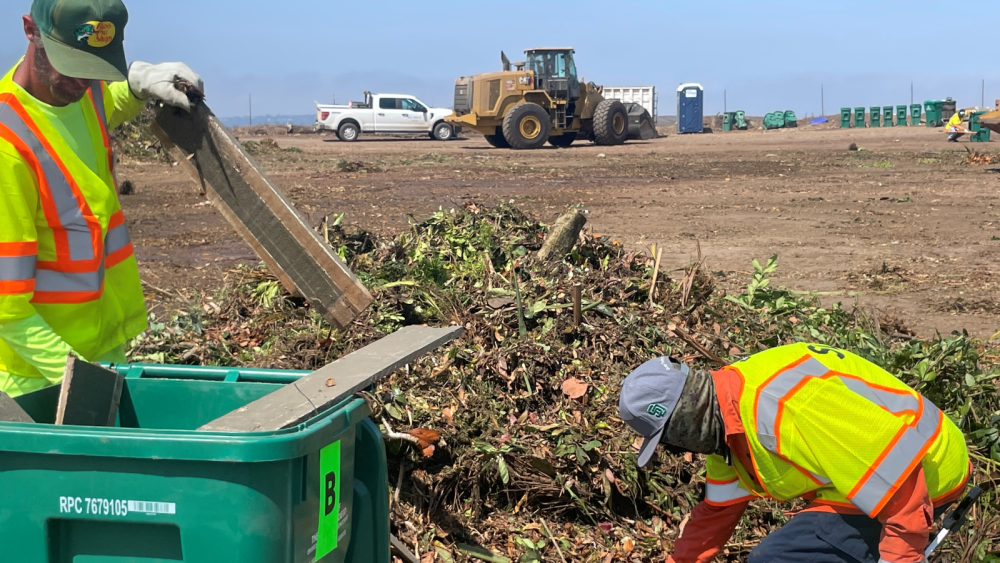City of San Diego Pilots Program to Help Eliminate Contaminants in Green Bins

Glass bottles, plastic bags, scrap metal and helium tanks. Those are just a few of the items found during an organic waste contamination removal pilot program conducted by the City of San Diego’s Environmental Services Department. Aimed at identifying and removing contaminants, the pilot program looked at what San Diegans are placing in their green bins, collecting data that can inform outreach and education, with an overall goal of increasing organic waste recycling and decreasing contamination.
Since expanding organic waste collection in 2023, the City of San Diego has empowered more than 200,000 San Diegans to divert waste from the landfill by tossing their food scraps and yard waste into their green bins for weekly collection. For the most part, everyone who has been recycling organic waste has contributed to the City’s increase in green bin tonnage, which jumped from 142,297 tons in 2023 to 194,310 tons in 2024.
However, there is room for improvement in terms of what does and doesn’t end up in green bins and how that affects the quality of compost produced at the Miramar Greenery.
While the existing process at Miramar Greenery involves removing contaminants through a grinding and screening process, the “Follow the Compost Pile” pilot program had the City incorporate manual sorting, also called picking, to remove contaminants before the material is ground into compost. The pickers themselves are part of a collaboration with East County Transitional Living Center, an organization that provides opportunities for individuals experiencing homelessness to re-enter the workforce.
Contaminants observed during the pilot program were documented, weighed and manually removed. The two-week picking and documentation process ended on Aug. 20, but it will take several weeks to analyze the data. The program also aims to assess improvements to the composting process at the Miramar Greenery.
“If we are able to implement this process moving forward, we can lower the number of contaminants at the end, improve operational efficiencies, and in turn produce better compost to put out to the community,” said Jennifer Winfrey, Assistant Deputy Director in the Environmental Services Department.
Meanwhile, the City is re-igniting education outreach efforts. A fully integrated, multilingual campaign – funded by a state CalRecycle grant – will launch this fall to encourage awareness about organic waste, which accounts for a significant portion of San Diego’s waste stream. Left to decompose in landfills, organic waste releases methane, a gas that traps the sun’s heat and warms the atmosphere. If not managed appropriately, decomposing organics are a significant source of greenhouse gas emissions. They emit 20% of the state’s methane, a climate super pollutant 84 times more potent than carbon dioxide.
Of the do’s and don’ts of organic waste recycling, one of the biggest issues is the prevalence of plastic bags. Even if they are labeled compostable, they are not allowed in the green bin.
“A single plastic or compostable bag that moves through our composting and grinding process can ultimately result in a thousand tiny pieces of plastic,” said Winfrey.
Organic waste recycling is required by state law as outlined in Senate Bill 1383, which requires the reduction of organic waste disposed of in landfills. Items that can go in the green bin include yard waste (such as grass clippings and branch trimmings) and food scraps (such as eggshells, vegetable and fruit peelings, coffee grounds and chicken and meat bones). The City’s Curbside Organic Waste Recycling Guide includes a comprehensive list and is available online in four languages. Recycling options for hard-to-recycle items like appliances, bulky items and electronics are available at WasteFreeSD.org.
About the Environmental Services Department:
The Environmental Services Department (ESD) ensures that City of San Diego residents have a clean and safe environment. The department pursues waste management strategies that emphasize waste reduction; recycling and composting; and environmentally sound landfill management.
